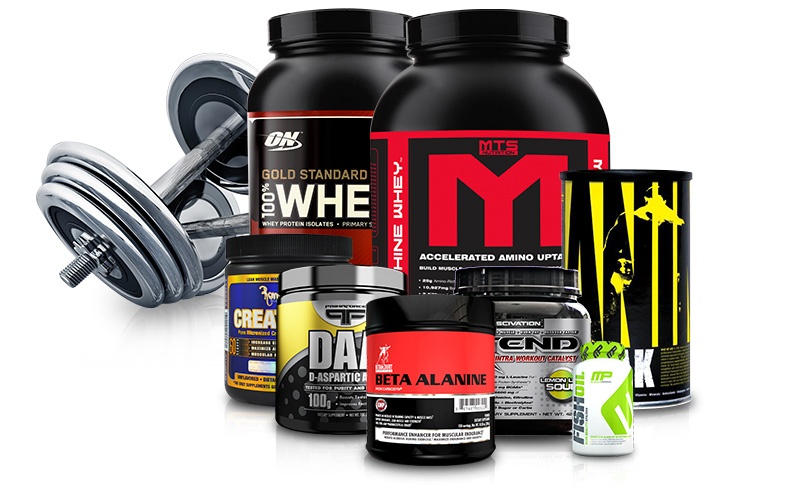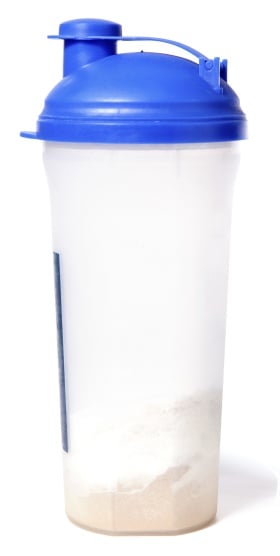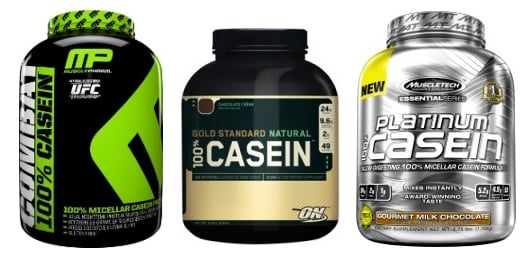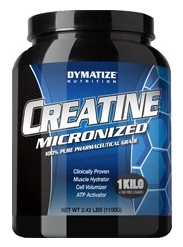01dragonslayer
Ripped
- Jacked Cash
- 537,163
Take your lean bulk to the next level by implementing an intelligent and effective supplement plan. This complete guide looks at the science behind all major bulking supplement choices.
As a follow-up, I wanted to explore lean bulking supplementation. This article will not focus on supplements that are said to benefit metabolism or the fat burning process, though several categories of supplements benefit both muscle building and fat loss.
The Muscle & Strength store has over 30 categories of supplements. Many of these categories, such as the creatine page and amino acids page, have numerous sub-categories. This provides the average lifter with over 100 different types of bulking products to choose from. This is a staggering, and certainly intimidating number of choices.
While it is beyond the scope of this article to look at every possible bulking supplement option, I do want to provide you with some of the best options. These products are researched and science-backed, and should be at the top of your to be considered list.
It's important that you know when I say science-backed, I did not simply run out to find studies that backed my pre-conceived notion of which supplements were important. Instead, I went into this article with a clean slate. I visited some of the most respected research sites on the net and listened to what they had to say.
What follows is a comprehensive look at supplements that can be beneficial during a lean bulk. It is for you to decide which products might be worth trying, and which aren't needed. Each us us has unique needs, and of course, a unique budget.

Note: These are supplement plans, not meal plans. They are meant to accompany whole food meals. Whey and casein shakes, or combinations thereof, are optional. You can certainly choose to eat a whole foods protein source such as eggs, beef, poultry, seafood, dairy, etc.

Muscle building is a battle. If you are tired, sore or unmotivated your performance will suffer. Small advantages can make a big difference.
Pre-workout supplements also contain other popular workout, focus and metabolism enhancing ingredients such as caffeine, citrulline malate, agmatine and more. This not only provides a high degree of convenience, but also makes pre-workout supplements a very cost-effective option.
 Whey protein powder is one of two muscle building proteins derived from milk, the other being casein protein powder. It is the most popular bodybuilding supplement on the market, primarily because it is a cost effective and convenient method of adding protein to your daily eating plan.
Whey protein powder is one of two muscle building proteins derived from milk, the other being casein protein powder. It is the most popular bodybuilding supplement on the market, primarily because it is a cost effective and convenient method of adding protein to your daily eating plan.
Whey protein powder comes in several forms:
Promotes muscle protein synthesis. Whey protein taken post-workout appears to promote a greater degree of muscle anabolism. [3,4,5] Simply stated, whey seems somewhat superior to other protein sources when it comes to increasing rates of muscle protein synthesis.

It should be noted that creatine comes not only in powder form, but is also featured in most pre-workout supplements.
There is notable research showing that the use of beta-alanine works to amplify the benefits of creatine. [5] For this reason it is wise to take these 2 supplements together.
Creatine comes in many forms, though creatine monohydrate is the most researched and recommended:
Increases power output. Numerous studies, including a few major meta-analyses, show that creatine can increase power output by up to 12%. [7,8] This power increase can lead to improved increases in strength. Because relative strength increases are the prime mechanism that drive muscle gains, creatine, more than any other supplement, can amplify the results of proper training.
Improved muscular mass. A study of prolonged creatine use revealed that it leads to an increase in muscle mass and an overall improvement in fat-free mass. [9]
As with creatine, beta-alanine has become a very popular ingredient in pre-workout formulas. They are often combined because of their synergism.
It should be noted that using a pre-workout formula that features these 2 supplements provides no guarantee that you are intaking optimal amounts of either. Make sure to check your pre-workout's label. Also understand that most protocols call for creatine to be taken post-workout. Because of this, it might be worth your while to invest in both a creatine and beta-alanine powder. Obviously, you won't be taking a pre-workout supplement after you lift.
Many popular post-workout (recovery) supplements, such as Ronnie Coleman's Pro-Antium and Recon by MusclePharm, contain the pairing of creatine and beta-alanine.

Fatigue reduction. Several notable studies showed that beta-alanine supplementation has the potential to reduce fatigue, allowing you train a little longer before reaching the exhaustion stage. [11,13,18] During one study of football players, beta-alanine increased training volume on the bench press while reducing the subjective feeling of fatigue. [13]
Lean mass increase. Because of fatigue reduction, increased muscular endurance and gym performance, beta-alanine has been shown to improve body composition and lean muscle mass level. [14,15,16]

Instead of comparing whey and casein, it is generally more beneficial to view them as 2 unique protein sources, each capable of providing unique advantages. Casein is a slower digesting protein. While it takes longer to peak blood leucine and amino acid levels, the elevation of these levels are quite prolonged when compared to whey protein.
It should be noted that while whey protein is known for improving protein synthesis, casein protein helps fight against protein degradation. This is important because the levels of amino acids within muscle cells are determined not only by rates of protein synthesis, but also by the rates of muscle protein degradation.
When there is a higher degree of amino acids in the blood stream, muscle cells will not have to utilize contained amino acids for other important bodily functions.

If you feel that your testosterone levels aren't what they used to be, or you are entering a more stressful period of your life, DAA supplementation may be worth consideration.
At the end of the day, if you feel a supplement from this list has value my best advice is to try it. Nothing can replace personal experience.
I would also like to mention that many of the supplements in this section can be used as a backup plan, or to smooth out the bumps in the road. None of us is perfect. We go through cycles in life where we can't eat in an optimal manner, feel more fatigued, achy, or susceptible to illness because of varying sleep and stress patterns. For this reason it might be worth your while to keep some of these products on hand, or to use them on a daily basis just in case.
Muscle building is a battle. Often times the difference between completing a rep and failing can be a trivial amount of strength. It also goes without saying that overall recovery and daily energy levels can play an important role in workout performance, and the subsequent results. If you are tired, sore or unmotivated your performance will suffer.
On some training days small advantages can make a big difference, While an off day certainly isn't the end of the world, it should be the goal of each lifter to improve recovery, sleep, joint health and performance as much as possible.
My best advice is to prioritize your supplement purchases based on needs. If you have issues getting enough sleep, you may want to try ZMA or another sleep aid. If it's hard for you to eat properly each day, a quality multivitamin and fish oil might be worth your time.
Fish oil supplements are derived from a variety of oily fish. They provide a natural source of Omega-3 essential fatty acids, also known as EFAs. Here are some of the noteworthy benefits of fish oil supplements:
Daily Dose - 250mgs minimum. The American Heart Association recommends 1 gram per day. If the goal is to reduce muscle soreness, several sources recommend a dosage of about 6 grams per day.

It should be noted that all multivitamin supplements are not created equally. Several popular mass-produced options have received criticism for containing dosages that vary greatly from the stated label quantities.
Here are some noteworthy benefits of multivitamin/mineral supplements:
Daily Dose - Multivitamin/mineral products contain a myriad of ingredients. Make sure to check labels to find out how many daily tablets or pills are required for that specific product.
BCAA supplementation is not necessary but provides important benefits if taken at appropriate times. Here are some of the noteworthy benefits of BCAA supplements:
Daily Dose - Dosages can vary, containing 7.5 to 15 grams of BCAAs per scoop.
Testosterone spikes from DAA supplementation are typically temporary, lasting upwards of 2 weeks in healthy men. For this reason, it may be more beneficial to cycle on and off DAA, or save DAA supplementation for periods of your life when sleep is sub-par or stress is higher than normal.
Here is a noteworthy benefits of DAA supplementation:
Daily Dose - A typical dosage is between 2,000 and 3,000 mgs per day.
This Guide Teaches You:
- How to fortify your lean bulk diet with the right supplements
- When to take popular supplements relative to your style of eating
- Why whey and casein protein work well together and promote muscle cell anabolism
- The importance of combining creatine and beta-alanine for improved results
- The many benefits of supplementing with fish oil and a multivitamin/mineral
- How to cycle DAA to naturally raise your testosterone levels
Table of Contents:
- 1. Two lean bulking supplement plan options
- 1.1. Option 1 - Frequent feeding
- 1.2. Option 2 - Fasting/intermittent fasting
- 2. Major supplement choices
- 2.1. Whey protein powder
- 2.2. Creatine
- 2.3. Beta-alanine
- 2.4. Casein protein powder
- 3. Minor supplement choices
- 3.1. Fish oil
- 3.2. Multivitamin/mineral
- 3.3. BCAAs
- 3.4. DAA
As a follow-up, I wanted to explore lean bulking supplementation. This article will not focus on supplements that are said to benefit metabolism or the fat burning process, though several categories of supplements benefit both muscle building and fat loss.
The Muscle & Strength store has over 30 categories of supplements. Many of these categories, such as the creatine page and amino acids page, have numerous sub-categories. This provides the average lifter with over 100 different types of bulking products to choose from. This is a staggering, and certainly intimidating number of choices.
While it is beyond the scope of this article to look at every possible bulking supplement option, I do want to provide you with some of the best options. These products are researched and science-backed, and should be at the top of your to be considered list.
It's important that you know when I say science-backed, I did not simply run out to find studies that backed my pre-conceived notion of which supplements were important. Instead, I went into this article with a clean slate. I visited some of the most respected research sites on the net and listened to what they had to say.
What follows is a comprehensive look at supplements that can be beneficial during a lean bulk. It is for you to decide which products might be worth trying, and which aren't needed. Each us us has unique needs, and of course, a unique budget.

2 Lean Bulk Supplement Plan Options
What follows are 2 lean bulk supplement plan options:- Option 1 - For a typical frequent feeding lifestyle of 3-6+ meals per day.
- Option 2 - For a fasting lifestyle in which the majority of food is eaten between a 4 to 8 hour window each day.
Note: These are supplement plans, not meal plans. They are meant to accompany whole food meals. Whey and casein shakes, or combinations thereof, are optional. You can certainly choose to eat a whole foods protein source such as eggs, beef, poultry, seafood, dairy, etc.
Option 1 - Frequent Feeding
| Option #1 | |
|---|---|
| Frequent Feeding | |
| Time/Meal | Supplement Recommendations |
| 7am - Meal 1 | Meal plus: (Optional) Protein shake with 1 scoop whey powder, 1/2 scoop casein powder. (Optional) Fish oil, 1 softgel equivalent to 1,000mgs. (Optional) Multivitamin/Mineral tablet. (Optional) 1,500mgs of DAA, or testosterone booster with equivalent amount. |
| 9:30am - Meal 2 | Meal plus: (Optional) Fish oil, 1 softgel equivalent to 1,000mgs. |
| Noon - Meal 3 | Meal plus: (Optional) Fish oil, 1 softgel equivalent to 1,000mgs. |
| 2:30pm - Meal 4 | Meal plus: (Optional) Fish oil, 1 softgel equivalent to 1,000mgs. |
| 4pm - Pre-Workout | 5 grams of creatine with 2 grams of beta-alanine, or equivalent pre-workout. (Optional) If not taking a pre-workout, you could mix creatine and beta-alanine with 1 scoop of BCAA powder. |
| 5pm to 6pm (Intra-Workout) | 1-2 scoops of BCAA powder in water |
| 6pm - Post-Workout | Protein shake with 1 scoop whey powder, 1/2 scoop casein powder. 5 grams of creatine with 2 grams of beta-alanine, or equivalent post-workout/recovery supplement. |
| 7pm - Meal 5 | Meal plus: (Optional) Fish oil, 1 softgel equivalent to 1,000mgs. |
| 9:30pm - Meal 6 | Meal plus: Protein shake with 1 scoop casein powder. (Optional) Fish oil, 1 softgel equivalent to 1,000mgs. (Optional) Multivitamin/Mineral, if second tablet is required. (Optional) 1,500mgs of DAA, or testosterone booster with equivalent amount. |
Option 2 - Fasting
| Option #2 | |
|---|---|
| Fasting | |
| Time/Meal | Supplement Recommendations |
| 7am | Protein shake with 1 scoop whey powder, 1/2 scoop casein powder. (Optional) Fish oil, 1 softgel equivalent to 1,000mgs. (Optional) Multivitamin/Mineral tablet. (Optional) 1,500mgs of DAA, or testosterone booster with equivalent amount. |
| 9:30am | (Optional) Fish oil, 1 softgel equivalent to 1,000mgs. (Optional) 1 scoop of BCAA powder in water |
| Noon | Protein shake with 1 scoop whey powder, 1/2 scoop casein powder. (Optional) Fish oil, 1 softgel equivalent to 1,000mgs. |
| 2:30pm | (Optional) Fish oil, 1 softgel equivalent to 1,000mgs. (Optional) 1 scoop of BCAA powder in water |
| 4pm - Pre-Workout | 5 grams of creatine with 2 grams of beta-alanine, or equivalent pre-workout. (Optional) If not taking a pre-workout, you could mix creatine and beta-alanine with 1 scoop of BCAA powder. |
| 5pm to 6pm (Intra-Workout) | 1-2 scoops of BCAA powder in water |
| 6pm - Post-Workout | Protein shake with 1 scoop whey powder, 1/2 scoop casein powder. 5 grams of creatine with 2 grams of beta-alanine, or equivalent post-workout/recovery supplement. |
| 7pm - Meal 1 | Meal plus: (Optional) Fish oil, 1 softgel equivalent to 1,000mgs. |
| 9:30pm - Meal 2 | Meal plus: Protein shake with 1 scoop casein powder. (Optional) Fish oil, 1 softgel equivalent to 1,000mgs. (Optional) Multivitamin/Mineral, if second tablet is required. (Optional) 1,500mgs of DAA, or testosterone booster with equivalent amount. |

Muscle building is a battle. If you are tired, sore or unmotivated your performance will suffer. Small advantages can make a big difference.
The Major Players
The following 4 supplements are your best lean bulking choices. They are industry staples, well-researched, cost-effective, and provide the most bang for your bulking buck.- Whey Protein Powder - A convenient way of adding protein to your daily diet. Also promotes muscle protein synthesis and lean muscle gains.
- Creatine - Heavily researched and a proven performance enhancer. Also extremely cost-effective.
- Beta-Alanine - Works synergistically with creatine as an effective workout-boosting stack. Helps reduce fatigue and boost set performance.
- Casein Protein Powder - Works to elevate blood amino acid levels and reduce muscle cell protein degradation, which promotes muscle cell anabolism.
Pre-workout supplements also contain other popular workout, focus and metabolism enhancing ingredients such as caffeine, citrulline malate, agmatine and more. This not only provides a high degree of convenience, but also makes pre-workout supplements a very cost-effective option.
Whey Protein Powder

Whey protein powder comes in several forms:
- Whey Concentrate - Typically refers to a whey protein powder that contains less than 90% concentration. The other 10% (or more) is made up of lactose, fats and minerals. Whey concentrate is extremely cost effective and therefore a very popular choice.
- Whey Isolate - Isolate is the purest form of whey protein powder, featuring concentrations of 90% and greater. Because of this purity, it is also the most expensive as well as being slightly lower in calorie.
- Whey Protein Hydrolysate - This is the purest form of whey protein powder, with about 99% of its weight coming directly from whey. It goes without saying that this is the most expensive form of whey protein. Hydrolyzed whey is "pre-digested", allow for more rapid digestion.
- Whey Blend - Blends are a combination of whey protein isolates and concentrates. They provide a good mix of quality and price.
- Weight Gainer - A high calorie, high carb option for lifters who require a substantial amount of daily calories. The protein content in weight gainers is primarily comprised of whey concentrate.
The Scoop on Whey Protein
- Adds over 20 grams of protein per scoop.
- Comes in a wide variety of quality flavors and brands.
- Is not exceptionally filling and is an excellent way (no pun intended) of adding protein in between major meals.
- It is fast digesting.
- Can be mixed with water, milk or blended into a smoothie.
- A solid choice post-workout or in between meals when you need a convenient or non-filling protein food choice.
- For best results whey protein powder should be used to compliment a wide variety of whole foods protein sources such as beef, poultry, eggs, fish and dairy.
The Science of Whey Protein
Promotes lean muscle gains. Protein promotes increases in lean muscle mass. [1,2] While research does not indicate that whey protein is any more effective at increasing lean muscle tissue than other protein sources, whey protein powder does provide a convenient way to reach daily intake goals.Promotes muscle protein synthesis. Whey protein taken post-workout appears to promote a greater degree of muscle anabolism. [3,4,5] Simply stated, whey seems somewhat superior to other protein sources when it comes to increasing rates of muscle protein synthesis.
Whey Protein Cost Per Day
Note: Cost is based upon current whey protein blend prices, and appear in USD.- One scoop per day - $0.70
- Two scoops per day - $1.40
- Three scoops per day - $2.10

"I honestly see no reason why somebody shouldn't supplement creatine, nor do I see any logical basis for the seeming 'fear' of this compound in society. It's safe, it's healthy, it's cheap, and for most people, it just works." - Kurtis Frank, examine.com
Creatine
Creatine is the most researched supplement in the history of the muscle building industry, and for a reason...it works. Contrary to many of the myths propagated in gyms or on the Internet, creatine is safe and does not promote bloating. It is also extremely cost-effective and yields numerous benefits. Consider creatine a lean bulking essential.It should be noted that creatine comes not only in powder form, but is also featured in most pre-workout supplements.
There is notable research showing that the use of beta-alanine works to amplify the benefits of creatine. [5] For this reason it is wise to take these 2 supplements together.
Creatine comes in many forms, though creatine monohydrate is the most researched and recommended:
- Creatine Monohydrate - Highly researched, effective and low-cost.
- Creatine Ethyl Ester - The second most popular form of creatine, creatine ethyl ester appears in several popular pre-workouts. It is claimed that CEE has a better absorption rate and half-life than creatine monohydrate.
- Creatine Blends - A growing subcategory, blends are creatine products that may combine multiple creatine forms along with vitamins, minerals and other popular supplements.
The Scoop on Creatine
- Extremely safe.
- Well-researched.
- Very cost-effective.
- Can be used in powder form or as a part of many popular pre-workout supplements.
- Provides a myriad of benefits, making it virtually an essential muscle building supplement.
- Can be mixed with water, liquid of choice or ingested as a part of numerous pre-workouts.
- Typically used at a dosage of 2-5 grams both pre and post-workout.
- Slightly higher dosages may be beneficial for individuals who have more muscle mass, or who have higher activity levels/greater degree of training intensity and/or volume.
- Micronized creatine dissolves more easily, making it a more convenient choice if you are mixing it with water.
 The Science of Creatine
The Science of Creatine
Increases power output. Numerous studies, including a few major meta-analyses, show that creatine can increase power output by up to 12%. [7,8] This power increase can lead to improved increases in strength. Because relative strength increases are the prime mechanism that drive muscle gains, creatine, more than any other supplement, can amplify the results of proper training.Improved muscular mass. A study of prolonged creatine use revealed that it leads to an increase in muscle mass and an overall improvement in fat-free mass. [9]
Creatine Cost Per Day
Note: Cost is based upon current creatine monohydrate powder prices, and appear in USD.- 6 grams per day - $0.14
- 10 grams per day - $0.24
- 20 grams per day - $0.47
Beta-Alanine
Beta-alanine is perhaps the most under-appreciated supplement in the muscle building world. Though research reveals several minor benefits to supplementing beta-alanine without creatine, the combination of these 2 compounds appears to work as an amplifier.As with creatine, beta-alanine has become a very popular ingredient in pre-workout formulas. They are often combined because of their synergism.
It should be noted that using a pre-workout formula that features these 2 supplements provides no guarantee that you are intaking optimal amounts of either. Make sure to check your pre-workout's label. Also understand that most protocols call for creatine to be taken post-workout. Because of this, it might be worth your while to invest in both a creatine and beta-alanine powder. Obviously, you won't be taking a pre-workout supplement after you lift.
Many popular post-workout (recovery) supplements, such as Ronnie Coleman's Pro-Antium and Recon by MusclePharm, contain the pairing of creatine and beta-alanine.
The Scoop on Beta-Alanine
- Cost- effective.
- Can be mixed into protein shakes, water, juice or other supplement drinks.
- Amplifies the benefits of creatine, making it one of the best bulking supplement choices on the market.
- Can be purchased in powder form, or as a part of a pre-workout formula.
- Typically used at a dosage of 2-5 grams per day.
- Beta-alanine supplementation does not appear to be time dependent, which means it doesn't matter when you take it during the day.
- Beta-alanine consumption in large dosages can produce a harmless tingling sensation, most prominently noticed in the face. When broken up into smaller, more frequent dosages, this side effect of beta-alanine is minimized.

"In premise, by buffering acidosis, beta-alanine might allow a lifter to get more reps at a given load; like creatine this would be expected to improve the rate of gains." - Lyle McDonald
The Science of Beta-Alanine
Increases muscular endurance. A meta-analysis of beta-alanine reveals that it can potentially yield a 2.5% increase in muscular endurance. This endurance boost was observed for work up to 240 seconds in duration. Beta-alanine is capable of improving exercise set performance, even during extended pump work such as burn sets, drop sets and supersets. [11,12]Fatigue reduction. Several notable studies showed that beta-alanine supplementation has the potential to reduce fatigue, allowing you train a little longer before reaching the exhaustion stage. [11,13,18] During one study of football players, beta-alanine increased training volume on the bench press while reducing the subjective feeling of fatigue. [13]
Lean mass increase. Because of fatigue reduction, increased muscular endurance and gym performance, beta-alanine has been shown to improve body composition and lean muscle mass level. [14,15,16]
Beta-Alanine Cost Per Day
Note: Cost is based upon current beta-alanine powder prices, and appear in USD.- 2 grams per day - $0.17
- 5 grams per day - $0.43

Casein Protein Powder
There is strong research supporting the benefits of casein protein supplementation. Despite evidence that it may be as beneficial as whey protein powder, casein protein powder continues to play second fiddle to its milk protein brother.Instead of comparing whey and casein, it is generally more beneficial to view them as 2 unique protein sources, each capable of providing unique advantages. Casein is a slower digesting protein. While it takes longer to peak blood leucine and amino acid levels, the elevation of these levels are quite prolonged when compared to whey protein.
It should be noted that while whey protein is known for improving protein synthesis, casein protein helps fight against protein degradation. This is important because the levels of amino acids within muscle cells are determined not only by rates of protein synthesis, but also by the rates of muscle protein degradation.
The Scoop on Casein Protein Powder
- Adds over 20 grams of protein per scoop.
- Comes in a wide variety of brands and flavors.
- Excellent option before bed and prior to periods of prolonged fasting because of its ability to keep blood amino acid levels elevated.
- Works synergistically with whey protein to promote muscle cell anabolism.
- Can be mixed with water, milk or blended into a smoothie.
- A solid choice before bed or prior to extended periods of fasting.
- For best results casein protein powder should be used to compliment a wide variety of whole foods protein sources such as beef, poultry, eggs, fish and dairy.
The Science of Casein Protein
Reduces muscle protein degradation. Blood amino acid levels play a significant role in attenuating muscle protein degradation. [17] Because casein has the capability of keeping blood amino acid levels elevated for a prolonged period of time, when compared to whey protein, it actually works hand-in-hand with whey protein to keep a cell in a more anabolic state.When there is a higher degree of amino acids in the blood stream, muscle cells will not have to utilize contained amino acids for other important bodily functions.
Casein Protein Cost Per Day
Note: Cost is based upon current casein protein blend prices, and appear in USD.- One scoop per day - $0.90
- Two scoops per day - $1.80
- Three scoops per day - $2.70

If you feel that your testosterone levels aren't what they used to be, or you are entering a more stressful period of your life, DAA supplementation may be worth consideration.
The Minor Players
The following supplements provide a wide variety of benefits. It is up to you to determine whether these myriad benefits provide value. Each of us is a unique physiological entity with varying sleep patterns, energy levels, joint strengths and weaknesses and eating habits. Because of this reality, some of the supplements in this section will be worth your while, and some unnecessary.At the end of the day, if you feel a supplement from this list has value my best advice is to try it. Nothing can replace personal experience.
I would also like to mention that many of the supplements in this section can be used as a backup plan, or to smooth out the bumps in the road. None of us is perfect. We go through cycles in life where we can't eat in an optimal manner, feel more fatigued, achy, or susceptible to illness because of varying sleep and stress patterns. For this reason it might be worth your while to keep some of these products on hand, or to use them on a daily basis just in case.
Muscle building is a battle. Often times the difference between completing a rep and failing can be a trivial amount of strength. It also goes without saying that overall recovery and daily energy levels can play an important role in workout performance, and the subsequent results. If you are tired, sore or unmotivated your performance will suffer.
On some training days small advantages can make a big difference, While an off day certainly isn't the end of the world, it should be the goal of each lifter to improve recovery, sleep, joint health and performance as much as possible.
My best advice is to prioritize your supplement purchases based on needs. If you have issues getting enough sleep, you may want to try ZMA or another sleep aid. If it's hard for you to eat properly each day, a quality multivitamin and fish oil might be worth your time.
Fish Oil

Fish oil supplements are derived from a variety of oily fish. They provide a natural source of Omega-3 essential fatty acids, also known as EFAs. Here are some of the noteworthy benefits of fish oil supplements:- May work to help decrease high blood pressure. [19]
- There is strong evidence supporting the conclusion that fish oil reduces triglycerides, which can increase risk of heart disease. High triglycerides are also a marker for potential metabolic syndrome. [20,21,22,23]
- Fish oil has been shown to curb the side effects of major depression in a comparable manner to the anti-depression drug Prozac. [24] A meta-analysis of the impact of fish oil on depression revealed that fish oil above 60% EPA was effective at treating symptoms of depression. [25]
- Seen to have a minor impact on vascular reactivity, which creates a slight improvement in vascular function. [26,27]
- Fish oil may decrease vLDL, which is a precursor to bad cholesterol (LDL). [28,29,30]
- A study on women given fish oil resulted in a lowering reported rate of stress. [31]
- Fish oil has also been shown to have a minor impact on anxiety [32], memory [33], subjective well-being in non-depressive individuals [34], reduce risk of cognitive degeneration [35], and brain blood flow. [36]
- There is also speculation based on personal experience that fish oil in dosages of about 6 grams per day assists in reducing DOMS, or delayed onset muscle soreness.
Daily Dose - 250mgs minimum. The American Heart Association recommends 1 gram per day. If the goal is to reduce muscle soreness, several sources recommend a dosage of about 6 grams per day.
Fish Oil Cost Per Day
Note: Cost is in USD.- 1000 mgs per day - $0.09
- 3000 mgs per day - $0.27
- 6000 mgs per day - $0.54

Multivitamin/Mineral
A multivitamin and mineral supplement is meant to fill in the gaps of your existing eating plan. Because of the wide variety of ingredients, the benefits of this type of supplement are numerous and highly varied.It should be noted that all multivitamin supplements are not created equally. Several popular mass-produced options have received criticism for containing dosages that vary greatly from the stated label quantities.
Here are some noteworthy benefits of multivitamin/mineral supplements:
- Calcium - Shown to increase bone mineral density. [37]
- Chromium - Possible impact on depression [38] and libido in overweight individuals. [39]
- Magnesium - Magnesium deficiencies are very common, and can negatively impact blood pressure and insulin sensitivity. [40,41]
- Vitamin B12 - B12 levels tend to be lower in depressed individuals, implying that lower B12 consumption may increase the risk of depression. [42]
- Vitamin B3 - Also called niacin, vitamin B3 can improve cholesterol levels and lipids. [43,44,45]
- Vitamin B6 - When used in combination with leucine, vitamin B6 has been shown to increase fat oxidation. [46] Vitamin B6 also appears to improve growth hormone release during exercise. [47]
- Vitamin C - Because of its antioxidant properties, vitamin C works to improve blood flow. [48] Vitamin C supplementation is often used by athletes in an attend to improve immune system function.
- Vitamin D - Vitamin D provides numerous benefits, working to properly regulate testosterone levels [49]. Vitamin D supplementation also has been shown to reduce the likelihood of bone fractures when falling (in the elderly), revealing its impact on bone density and strength. [50]
- Vitamin E - Vitamin E is an antioxidant that works to support bone health [51] and work as a mineral detoxifier. [52,53]
- Zinc - Zinc works to improve immune system function [54] and regulate proper testosterone levels. [55]
Daily Dose - Multivitamin/mineral products contain a myriad of ingredients. Make sure to check labels to find out how many daily tablets or pills are required for that specific product.
Multivitamin/Mineral Cost Per Day
Note: Cost is in USD.- Recommened capsule serving per day - $0.50
BCAAs
BCAA (Branched Chain Amino Acids) supplements are comprised of 3 amino acids: Leucine, Isoleucine, and Valine. These extremely popular supplements are typically sold as a low/no calorie powdered drink mix, coming in flavors such as blue raspberry, watermelon and fruit punch. BCAA supplements also come in capsule form.BCAA supplementation is not necessary but provides important benefits if taken at appropriate times. Here are some of the noteworthy benefits of BCAA supplements:
- When taken intra-workout, BCAAs appear to reduce fatigue. This benefit most notably occurs in untrained and moderately trained athletes, but may also be beneficial (to a lesser degree) for the hard-working gym trainee. [56,57,58]
- Several studies have linked BCAA consumption with an increase in fat oxidation. [59] This certainly works towards maintaining the "lean" aspect of a lean bulk.
- Evidence supports that BCAA supplementation may lower the rate of perceived exertion, making sets or workouts feel slightly easier in magnitude. [60]
- BCAA supplementation was shown to induce a "significantly lower" degree of muscle soreness in untrained females performing 7 sets of squats. [61]
- BCAA usage may also be beneficial during a period of fasting. [62]
- Leucine, contained in a BCAA supplement, plays in important role in muscle protein synthesis. [63]
- If you are in the gym for a prolonged period of time, BCAA supplementation may help stave off fatigue. [64] This is especially true when glycogen stores are depleted. For this reason, individuals consuming a low carb diet might find more benefit from BCAA consumption intra-workout.
Daily Dose - Dosages can vary, containing 7.5 to 15 grams of BCAAs per scoop.
BCAA Cost Per Day
Note: Cost is based upon BCAA falvored powders, and appear in USD.- One scoop per day - $0.61
- Two scoops per day - $1.22
- Three scoops per day - $1.83
DAA
DAA, also know as D-Aspartic Acid, is one of two forms of the amino acid arspartic acid. DAA is often used in the muscle building world as a testosterone booster because of the role in plays in regulating testosterone synthesis.Testosterone spikes from DAA supplementation are typically temporary, lasting upwards of 2 weeks in healthy men. For this reason, it may be more beneficial to cycle on and off DAA, or save DAA supplementation for periods of your life when sleep is sub-par or stress is higher than normal.
Here is a noteworthy benefits of DAA supplementation:
- Seen to improve testosterone levels for a short period of time. [65] An increase of 15% in 6 days and 42% after 12 days was observed.
Daily Dose - A typical dosage is between 2,000 and 3,000 mgs per day.
DAA Cost Per Day
Note: Cost is based upon DAA powder prices, and appear in USD.- 3000 mgs per day - $0.21








